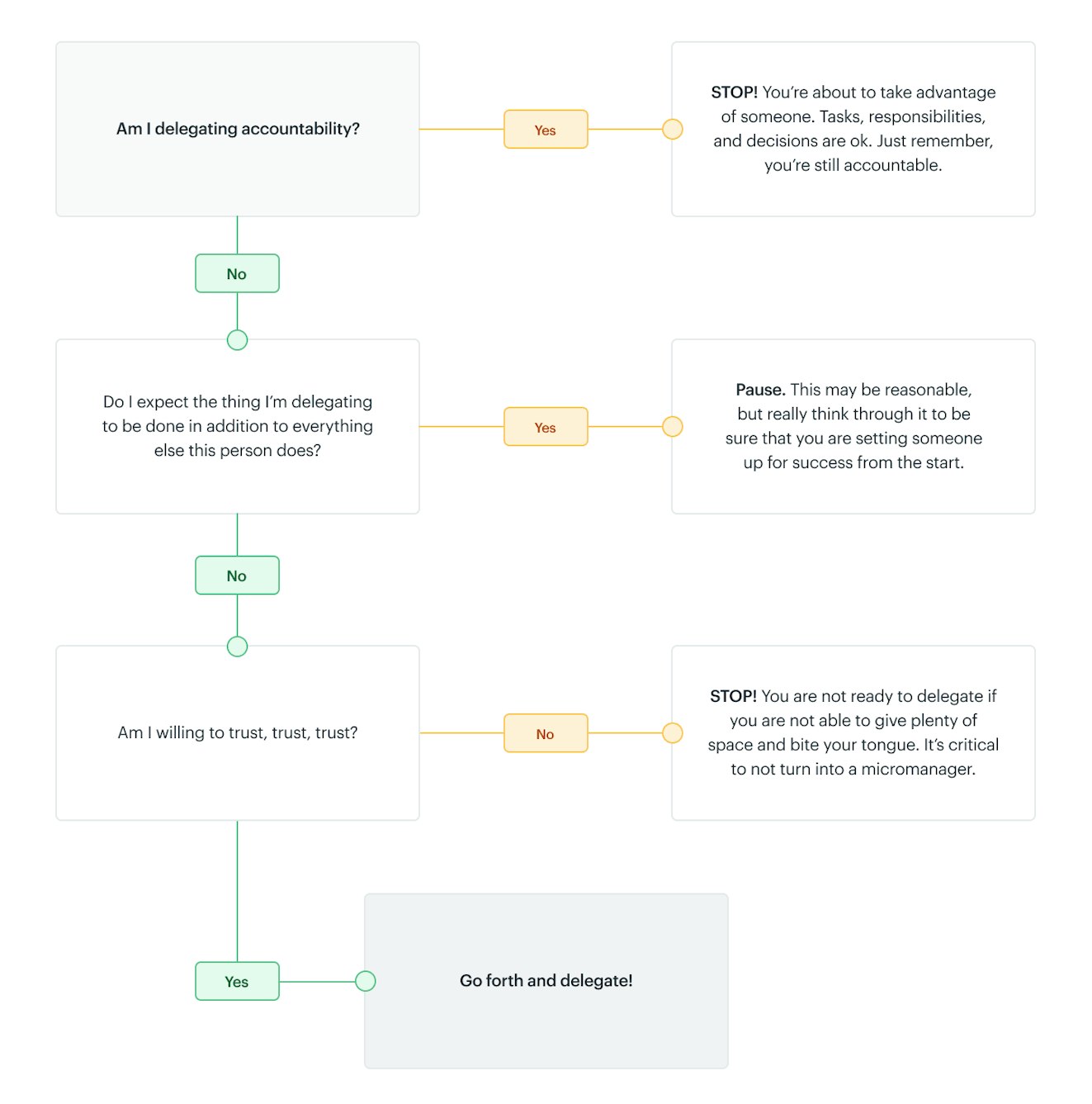You know you need to delegate. Everyone’s saying it — “delegate more!” — as if delegation is the solution to all of your problems.
It could be, actually — if you do it well. It took me 10 years to crack the code, so here’s the blog post I wish I had way back when, to make learning the art of delegation easy.
What it means to delegate
Delegation is commonly understood to mean entrusting a task or responsibility to another person, typically one who is less senior than oneself.
I like that the common definition leads with trust, but it doesn’t always include decisions among the examples of what can be delegated — which is unfortunate, because that’s where the real magic happens. A more modern definition might read:
Delegation is the act of entrusting a task, responsibility, or decision to another person, typically one who is less senior than oneself.
Delegation can be as much about helping your team grow as it can be about helping yourself grow. It’s certainly more of an art than it is a specific, always-do-it-this-way formula. Here are some questions you can ask yourself to help you decide if and what to delegate, and to whom:
Is the person meeting expectations? If not, is there anything on my plate that could help them learn whatever they need to better meet expectations? Or, does delegating to them jeopardize their success in their current role?
Where does this person want to go, and how do they want to grow? What is on my plate that will help them?
What am I really good at that I might find hard to delegate and, therefore, probably should?
What am I not so good at that would be better done by someone else, without forcing someone else to do my job for me?
Am I at a senior level and spending more time “doing” than thinking, discussing and deciding? If so, I’m likely doing work that I’ve hung on to as I’ve progressed my career and it’s time to let go.
It can also be helpful to just let folks opt in. “Here are some things on my plate … if you want to own any of this or help, let me know!”
Reading List
The goal of delegation
Delegation should feel like a gift, not one more thing causing yet another long day or meaningless project.
The end goal of delegation is to leave the person to whom you delegated feeling like this:
Wow, I learned so much doing that!
Now that I’ve done that, I am ready for ___!
Thank you for trusting me!
It felt so good to be recognized for that!
Here is how you do not want someone to whom you delegate to feel:
Why even ask me to do this if you’re just going to babysit my every move?
What was the point, if you’re just going to take credit for all the work I did?
Oh, I see, I’m doing your job for you. Why are you even here?
These are the most common results from poor delegation practices. They also earn you fancy names like micromanager, credit stealer, and advantage taker.
What to do before you even think of delegating
Before you begin to delegate, you must build a strong foundation. You need to have your team dynamic and your individual relationships with each member of your team in a healthy place. If you can’t respond with an enthusiastic yes! to all of the following questions, then you have some work to do before you start delegating.
Are you self-aware?
It can be tempting to tell someone how to do something you’re used to doing, maybe even really good at doing. Focus on what you need to delegate and why it matters, not how to do it (unless you are asked). Work on your self-awareness so that you can catch yourself if you start rambling about the "how".
Are the responsibilities/tasks of each role within your team (including yours) clear and transparent to the entire team?
Your team needs to understand what is expected of them and each other, and also of you. Taking time to write this down goes a long way. Your team will have a clearer sense of ownership and will likely take more ownership as a result. Your team will be able to identify things they want to learn or try. Bonus: Your team will likely see more clearly the value you bring to the team.
Does each member of your team (including you) trust and respect each other?
Mutual trust and respect is the first layer of building psychological safety, which is critical for people to feel comfortable taking risks. Doing new things is all about what can feel like one of the biggest risks of all: failure. The process of accepting delegated work can surface vulnerabilities that are easily mitigated with true psychological safety.
Does each member of your team (including you) believe it’s safe to fail?
This may well be the ultimate sign that your team has true psychological safety. Your team will only believe this to be true if they have examples of it being true. Let them fail, be sure they know it’s OK, and coach them to learn from it. The moment you lose your temper or show any signs you’re disappointed, you send the message that failure is not OK. It’s hard to come back from that.
Do you understand the strengths and growth opportunities for each member of your team (including you)?
Delegating something that plays on a strength will be a different experience than delegating something that highlights a growth opportunity. You may have to provide more coaching and encouragement, perhaps even training, for the latter. Linking a to-be-done delegated thing to either a strength or a growth opportunity will quickly tell you the level of effort you can expect for yourself, as well as the time necessary to complete the work.
Do you know how each member of your team wants to grow?
Understanding what your team members want for their career growth can uncover all sorts of delegation opportunities. If you have something to delegate that would help someone get to where they want to go, it’s probably a good idea to do so.
Does every member of your team understand the purpose, direction, and goals of their work?
This is the first step in aligning your team. The more aligned your team is, the easier it is to delegate more than just tasks — you can delegate harder things, like responsibilities and decisions. Delegation will surface misalignment, and that’s OK! Learn and grow from it. So long as you have some initial, basic alignment on the team, it’s OK to learn and grow together through the harder things that delegation surfaces.
Attempting delegation without this strong foundation is risky, and it could result in those unfavorable labels we talked about earlier.
Do you have a definition of success?
Before you delegate any task, responsibility, or decision, you (and your team) should understand what success looks like. Forcing yourself to define this upfront ensures that expectations are clear and that you’re focused on the why and what, not the how.
Gut-check yourself
Before you begin delegating, one last self-examination is in order to ensure that you and your team are all benefitting from the delegation process:

Here are a few tips if you’re particularly worried about taking advantage of someone (and you should be!):
Delegating things as a one-time effort can usually mitigate situations where someone ends up unfairly doing your job for you.
You can adjust job responsibilities and increase someone’s pay if it makes sense to make what you delegated a regular part of that person’s job.
If someone is near a promotion, it may be OK to delegate via a transition of responsibilities to help them prepare and prove themselves. Just be sure to take those things back if the promotion doesn’t happen.
Coach, encourage, and celebrate
While the members of your team work on what you’ve delegated to them, be sure to support them fully to reap the mutual rewards delegation offers.
Coach — They will have questions. Coach them. Be sure they have training if they need it to be properly enabled to try something for the first time. Pair them with someone who might be able to mentor them and provide additional support. Give them space to make it theirs and do things their way.
Encourage — They will have moments of doubt. Encourage them. Be vulnerable with them and share times when you’ve felt uncertain about whether you could do something you thought you wanted to do. Remind them it’s OK to fail. Remind them of what’s expected of them and adjust if it’s needed.
Celebrate — Regardless of the outcome, celebrate. If it’s a success, give them credit and be sure they are properly recognized. If it’s a failure, talk about what you’ve both learned and celebrate the journey together.
And now, when you hear yourself suggesting to someone else that they should delegate more, you can show them this article to help them learn how.







